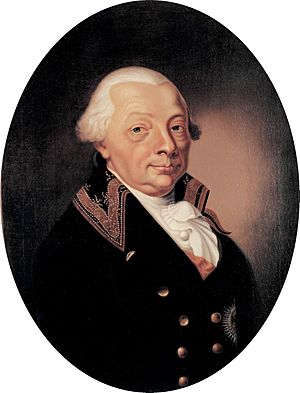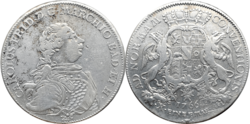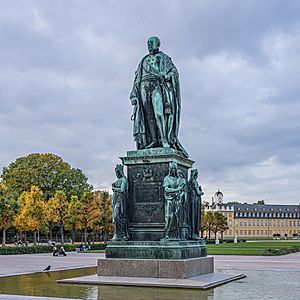Charles Frederick, Grand Duke of Baden facts for kids
Quick facts for kids Charles Frederick |
|
|---|---|

Portrait by Johann Ludwig Kisling, 1803
|
|
| Grand Duke of Baden | |
| Reign | 25 July 1806 – 10 June 1811 |
| Successor | Charles |
| Elector of Baden | |
| Reign | 27 April 1803 – 6 August 1806 |
| Margrave of Baden (unified) | |
| Reign | 21 October 1771 – 27 April 1803 |
| Predecessor | Augustus George, Margrave of Baden-Baden |
| Margrave of Baden-Durlach | |
| Reign | 12 May 1738 – 21 October 1771 |
| Predecessor | Charles III William |
| Born | 22 November 1728 Karlsruhe Palace, Karlsruhe, Margraviate of Baden-Durlach, Holy Roman Empire |
| Died | 10 June 1811 (aged 82) |
| Spouse |
Landgravine Caroline Louise of Hesse-Darmstadt
(m. 1751; died 1783)Louise Caroline, Baroness Geyer of Geyersberg
(m. 1787) |
| Issue | Charles Louis, Hereditary Prince of Baden Prince Frederick Louis I, Grand Duke of Baden Princess Louise Auguste Leopold, Grand Duke of Baden Prince William Prince Frederick Alexander Princess Amalie Prince Maximilian |
| House | Zähringen |
| Father | Frederick, Hereditary Prince of Baden-Durlach |
| Mother | Princess Amalia of Nassau-Dietz |
| Religion | Lutheran |
Charles Frederick (born November 22, 1728 – died June 10, 1811) was a very important ruler in a German state called Baden. He started as a Margrave, which was a type of count in charge of a border area. Later, he became an Elector, and finally the first Grand Duke of Baden. He ruled for a very long time, from 1738 until he passed away in 1811.
Contents
Life and Rule
Charles Frederick was born in Karlsruhe. His father was Prince Frederick of Baden-Durlach, and his mother was Amalia of Nassau-Dietz. She was the daughter of Johan Willem Friso, who was a Prince of Orange.
He became the Margrave of Baden-Durlach in 1738, taking over from his grandfather. He started ruling on his own in 1746. In 1771, he also inherited the region of Baden-Baden. This meant that the original land of Baden was finally reunited under one ruler.
An Enlightened Ruler
Charles Frederick was known as an "enlightened despot." This means he was a powerful ruler who used his power to make life better for his people. He believed in new ideas from the Age of Enlightenment, which focused on reason and progress.
He worked hard to improve many things in Baden. He supported schools and universities, making education better for everyone. He also improved the laws and the civil service, which is the group of people who work for the government.
He helped the economy grow and encouraged culture and city development. In 1767, he made torture illegal. In 1783, he ended serfdom, which was a system where people were tied to the land they worked on. This was a big step towards freedom for many people. In 1747, he was even chosen as a member of the Royal Society, a famous group of scientists.
Baden Grows Stronger
In 1803, Charles Frederick became the Elector of Baden. This was a higher title that gave him more power and importance in the Holy Roman Empire. Then, in 1806, he became the very first Grand Duke of Baden. This made Baden an even more important state.
During his rule, Baden grew much larger. It gained new territories, including parts of several bishoprics (areas ruled by bishops) and other regions like Breisgau and Ortenau. This expansion made Baden a stronger and more influential state.
In 1806, Baden joined the Confederation of the Rhine. This was a group of German states that were allied with Napoleon Bonaparte of France.
Charles Frederick also played a big role in making Karlsruhe a beautiful city. He worked with his architect, Friedrich Weinbrenner, to build many grand classical buildings. He died in Karlsruhe in 1811. He was one of the few German rulers who died peacefully during the time of the Napoleonic Wars, when many rulers were overthrown.
Family Life
Charles Frederick had two marriages and many children.
First Marriage
On January 28, 1751, Charles Frederick married Landgravine Caroline Louise of Hesse-Darmstadt. She was born in 1723 and passed away in 1783.
They had five children together:
- Charles Louis, Hereditary Prince of Baden (1755–1801): His son, Charles, later became the Grand Duke after Charles Frederick died.
- Prince Frederick of Baden (1756–1817): He married Louise of Nassau-Usingen.
- Prince Louis of Baden (1763–1830): He later became the 3rd Grand Duke of Baden.
- A son who was born and died on the same day (1764).
- Princess Louise Auguste of Baden (1767–1767): She also died very young.
Second Marriage
On November 24, 1787, Charles Frederick married Louise Caroline, Baroness Geyer of Geyersberg. She was born in 1768 and died in 1820. This was a special kind of marriage called a morganatic marriage. This meant that their children would not normally be able to inherit the throne.
Louise was given the title Baroness of Hochberg when they married, and then Countess of Hochberg in 1796. Her children also used these titles.
They had five children:
- Prince Leopold of Baden (1790–1852): He later became the Grand Duke of Baden.
- Prince William of Baden (1792–1859).
- Prince Frederick Alexander of Baden (1793–1793): He died as a baby.
- Princess Amalie of Baden (1795–1869).
- Prince Maximilian of Baden (1796–1882).
Changing the Rules
By 1817, it looked like the family line from Charles Frederick's first marriage might end. To make sure that Baden would not be inherited by another royal family, the reigning Grand Duke Charles (Charles Frederick's grandson) changed the rules. He gave the Hochberg family, from Charles Frederick's second marriage, full rights to the throne.
This meant that Leopold and his siblings became Princes and Princesses of Baden. Their right to inherit was confirmed in 1818 when Baden got a new constitution. Other powerful countries also agreed to this change. Leopold's family ruled the Grand Duchy of Baden until 1918. Today, the people who would be next in line for the throne of Baden are descendants of Leopold.
Leopold, the oldest son from the second marriage, became Grand Duke in 1830.
See also
 In Spanish: Carlos Federico de Baden para niños
In Spanish: Carlos Federico de Baden para niños
 | Sharif Bey |
 | Hale Woodruff |
 | Richmond Barthé |
 | Purvis Young |



